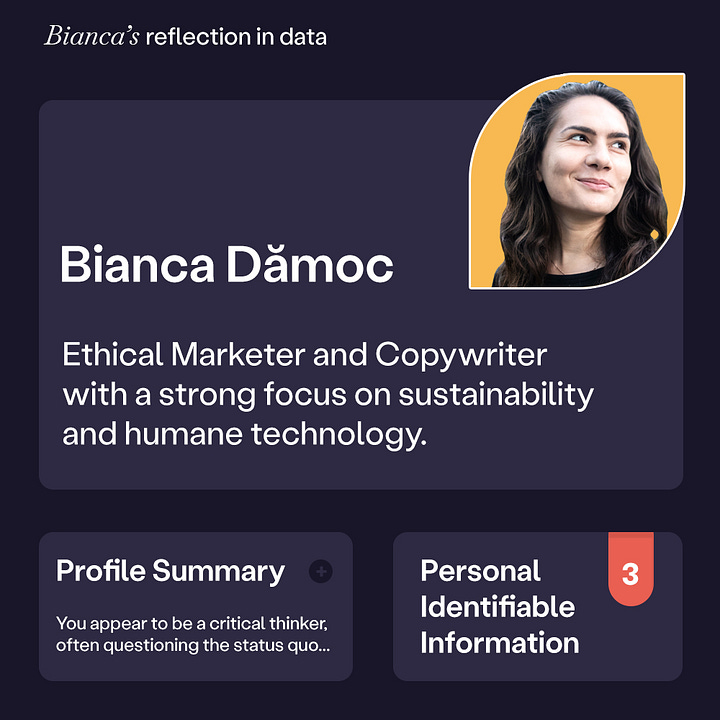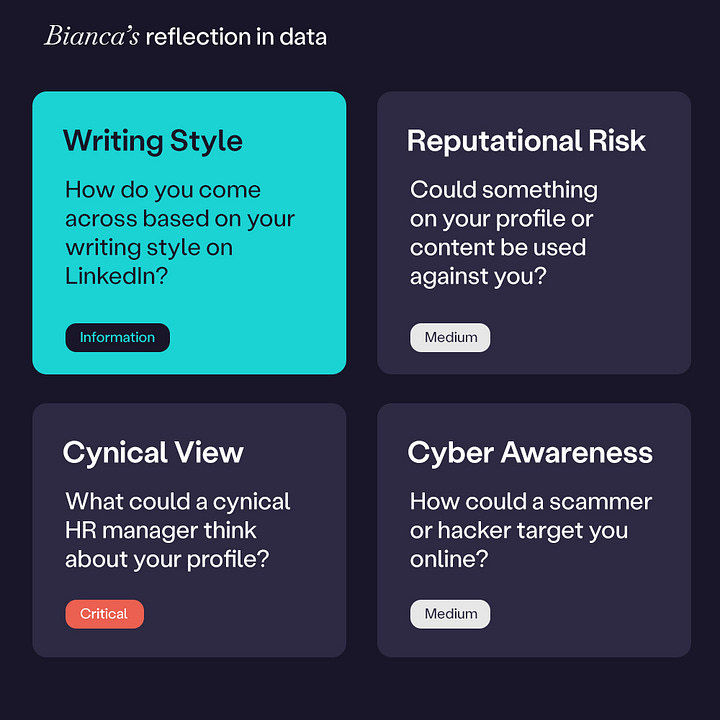How AI Could Make or Break Your Career
The tech sector is a bit of a wild ride right now—exciting salary spikes here, disheartening layoffs there. It's a whirlwind.
And amidst this chaos, Forrester's 2024 predictions throw in a twist— they warned that heavy use of AI tools in recruitment may cause a bit of a kerfuffle, including hiring a ghost (literally, a candidate that doesn't really exist) or real candidates chasing after a job mirage.
This rollercoaster underscores a pressing need for recalibration as we navigate through this rapid tech evolution and ever-shifting market demands.
So where does that leave the majority of applicants who simply want to be notified of, and appropriately considered for, the correct opportunities?
Here at Visible, we strongly believe that setting yourself up for success will require regular assessment of your digital identity and how it might be perceived on platforms like LinkedIn, both by AI algorithms and hiring managers.


This means that you’ll have to perform a constant balancing act that considers the competing desires to present our best selves and avoid putting our data at unnecessary risk, all while remaining authentic.
It’s hard, but not impossible. It’s also one of the reasons we designed our LinkedIn Report Tool.
Dancing with Your Digital Shadows
Professional networking platforms, such as LinkedIn, have become an indispensable tool for job seekers and recruiters. Avoiding them is almost impossible as it no doubt puts candidates at an immediate disadvantage.
For the majority of professional occupations, the initial stages of the job-hunting process are conducted entirely online. A significant proportion of vacancies are first discovered and applied for directly through the platform. And even when an application arrives from another source it’s likely LinkedIn will be one of the first places hiring managers will go to vet the new applicant.
Essentially, online participation in such digital arenas is almost mandatory. Ducking out of the LinkedIn dance is not really an option if you want to stay in the game.
However, it will come as no surprise to learn that every action you take online has consequences. Particularly at a time when regulators are fighting hard to keep up with advances in AI and its associated capabilities. The EU has made admirable efforts with the EU AI Act (still needs to be formally adopted by the EU Parliament) and, more recently, the Digital Markets Act that went into effect on March 8th.
Just as with the EU GDPR it’s likely to inform and accelerate similar regulatory conversations going on in North America and the rest of the world that could one day lead to the adoption of a global standard.
In the interim and beyond it’s vital to acknowledge that every click, swipe, like or comment leaves a trail of data that reveals who you are and how you think. It creates a digital self that is born not just from what you share publicly on social media, but how you behave when you think you have privacy (on spaces like Reddit, Quora and even dating apps.)
With AI data bias, unethical business practices and lagging AI regulation, the risks of life changing consequences are rapidly increasing. As an individual user, you have very little control over the actions of the platforms themselves. However, where you do have agency is in what data you choose to share with them in the first place.
Mastering Your Digital Body Language
In a more analogue age, it was common practice to ask a close friend or family member for a second opinion on a CV or job application before submitting it. In principle this approach still works, though AI and digital transformation have forever sped up the pace at which we must be able to interact online with new people and opportunities.
The control we have over how our data is used by such platforms is still largely limited.
In a world where one misjudged social post can have far-reaching consequences (see “cancel culture”) our means of sourcing a real-time external perspective must be scaled up and automated if it’s to prove practical across the sum of all our digital interactions. It doesn’t matter if the goal is to find a job, build a personal brand or attract a partner.
It’s here that AI can help level the playing field, bringing more objectivity to what you’re posting and how it’s likely to be interpreted by others.
This is what we’re looking to achieve with our own free LinkedIn Report tool.
Our ability to pursue multiple career options in a short timeframe is far greater than for previous generations. Though so are the consequences of getting it wrong. Ironically that may just mean fighting AI with AI.
Final Thoughts
Mastering your digital body language has never been more important. When left unchecked, your digital self can unknowingly come to portray you as someone you’re not, or someone that you don’t want to be.
With AI data bias, a lack of AI regulation and a growing reliance on it within recruitment, it’s important we all take stock of how our digital personas are likely to be interpreted by both people and machines.
We’re on a mission to put people in control of their privacy and the authentic version of themselves they want to show to AI, businesses, and people online. The stakes are too important to be passive. We must all actively participate.



